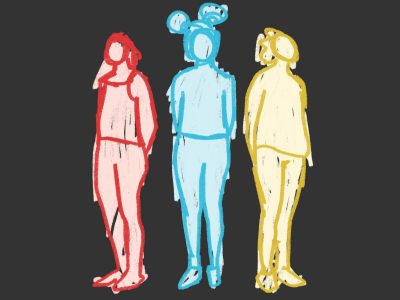Humans have tried to justify their gut feelings for centuries.
In the 17th century, alchemist and physician Jan Baptist van Helmont posited that everything we don’t understand or feel in the head or heart, but rather “the midriffs”: the gut.
Discussions of people having “vibes” can be traced back to the late 1800s. In the early 1890s, astrologer Frank Earl Ormsby posited that every earthly or celestial body emitted a distinct energy because the soul vibrated from within.

Modern understandings of vibes combine the concept of vibrations with van Helmont’s gut feelings. When we “vibe check,” we are relying on instincts we may not have a conscious understanding of.
Perhaps the most famous cultural marker of our modern understanding of vibes comes from the ’60s Beach Boys song “Good Vibrations.” Brian Wilson — one of the lead members of the Beach Boys — said he was inspired by his mother’s belief that dogs bark at people based on the “vibrations from … people that you can’t see, but you can feel.”
Discussions of vibes and energies are one of the greatest joys in my life. I had a friend tell me the other day they had to return a miniature waffle maker because its aura was so chafing, and it made me ridiculously happy.
But this very interaction also led me to think about the real use of vibes in describing our like or dislike of particular objects, people or concepts.
For instance, up until the 1800s, people in Europe believed the fork carried an “unsettlingly effeminate aura.”
Certain members of the church even condemned the use of forks because they thought their use would be an insult to the hands God gave you.
At what point do we stop sounding endearing for our arbitrary dislike of waffle makers and start sounding like medieval popes warning peasants about the inherent gay energy of forks?
To find an answer to this question, it is important to first discuss the mechanism behind our gut feelings. We assign these kinds of feelings to our gut partly because these feelings often have no conscious reasoning behind them.
One’s intuition is built up by past experiences and unconscious sensory perceptions.
For instance, human sweat glands emit different chemicals depending on the emotion one is experiencing, and other people can even sense these chemicals, according to a 2012 study published in Psychological Science.

We can also sense patterns without these chemicals. People could detect and predict intention based on another person’s movement just by using their intuition to decipher minute changes in the movement, according to a 2016 Nature Scientific Reports study.
In the case of the forks, perhaps the Europeans’ intuitions were discomforted by new, unfamiliar technology. But instead of trying to understand their discomfort, these people instead went ahead and blamed gay people.
The concept of vibes and energies gave them a way to offload the responsibility of feeling into some abstract other — something they could sense, but could not tangibly point to.
This is my main worry about our modern use of vibes. As vibes exist in the liminal space between reason and feeling, people don’t have to provide an explanation for why something gives them “bad vibes.” My friend told me the waffle maker had bad energy, and I believed her without needing any further justification.
But in leaving this dislike to the unexplained, our feelings toward new experiences may often go unfinished and unprocessed.
If my friend were to further analyze her dislike of the waffle maker, she may find she has a deep-rooted distrust of Belgian people or had a bad experience with a similar appliance as a kid.
In dissecting these feelings, we can more accurately understand ourselves and our relationship to the world around us. It is easier to label unconsciously perceived red flags as bad vibes because it means we don’t have to think about it that much.
I still believe the language of vibes provide an incredibly fun and useful way to understand our world. On one hand, I think it’s really funny that a defining feature of our generation’s vernacular is sounding like an intensely spiritual version of Shaggy from Scooby Doo. I really can’t wait to read a divorce settlement in which the reason for divorce is listed as mutual bad vibes.
On the other, I worry we aren’t taking full responsibility for our feelings. Vibes are an easy way to pass off your opinion as a sensory observation, rather than owning up to your bad takes.
You can dislike something without having to blame a mysterious, cosmic energy.
As an opinion columnist, some of my most embarrassing opinions are recorded on the internet forever. But I think it important — at times — to own up to your opinion without blaming cosmic energies.
Whether it be loathing a chafing waffle maker or a gay fork.






















































































































